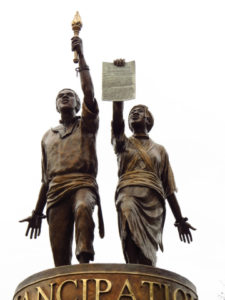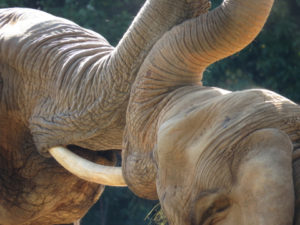
Leadership presence is the means by which our internal feeling states are shared into our relationships.
Consider this thought experiment. You are walking down the sidewalk alone, at night. Someone is coming the other way on the same sidewalk, a hundred yards away. There’s nobody else around. How does this feel?
Well, how it feels depends on a lot of things. If you are a woman, and the other person is a man, it’s likely to be different than if it’s the other way around. We sense the race, gender, age, manner of walking of the other person. Our nervous systems, unbidden, manufacture stories about the other person and the situation that may be wildly inaccurate but which we believe to be factual. As our two bodies sense each other from a distance, we each assess the relative power and risk in the situation. By the time we are within 50 feet of each other, both of us know who is going to step off the curb and defer to the other. No language is needed. This is an example of a relational field.
Another example. We sit through a keynote with a compelling speaker. The speaker looks around the room, sensing the audience. She takes her time, changing her voice and cadence, injecting humor to shift the feeling in the room, using both animated movement and stillness in her body to produce affect and dynamism in the audience. We are spellbound, riveted. We feel our own energy and aliveness, knowing that the moment is special, and that the whole room feels it.
We could analyze what she is doing in terms of presentation skills and non-verbal communication techniques, which is part of the truth. However, it is more precise to say that she is attuned to the audience, that the audience senses this connectedness with her, and that collectively, we are experiencing a relational field within which something remarkable is happening.
Consider that our relationships are, in large part, interactions between biological systems. To pretend that communication is simply a matter of speaking the right words ignores millions of years

of biology and a lifetime of accumulated experience. Relational fields are the invisible, yet palpable fields of energy that connect us when we are present with someone.
Skillful leadership has this kind of attunement. Presence can unite. Presence can build relatedness and connection.
Rather than the traditional heroic model of leaders acting on the world, and shaping it according to our intentions, we begin to experience leadership as a deeper process of acting with the world.
Why should leaders in complexity be concerned with this? In short, our internal condition is a significant factor in the dynamics of complexity. Our nervous system is a component of the feedback loops that build or undermine a system’s resilience. Anxious, driven, and over-focused leaders reinforce teams and organizations that are themselves anxious, driven, and over-focused. Settled, open, creative, and optimistic leaders foster the same traits in the human systems around them.
In complexity, much is unpredictable. However, when we learn to de-link our internal state from this unpredictable context, we begin to embody states that are congruent with what we care about.

Because of the relational field, our internal state is transmittable and palpable to others. (The examples in this post illustrate this principle.) Through presence, our state of creativity, optimism, settledness, and resourcefulness becomes available to others. Our nervous system becomes a resource for others. We often can’t know solutions to the complex, intractable problems we are facing. Yet, we can reduce the pervasive anxiety and stress within ourselves, and through our presence, in the system around us.
A striking example was shared with me by Charles Casto, the Nuclear Regulatory Commission’s senior executive in Japan during the Fukushima disaster. According to Casto, the remarkable leadership of Naohiro Masuda was a significant factor in avoiding catastrophe.
Masuda was the superintendent at Fukushima Daichi’s sister nuclear plant 10 miles up the coast. The sister plant, Fukushima Daini, faced similar conditions after being overwhelmed by the 2011 tsunami.
Barking orders and jumping into crisis problem-solving would likely not have worked in the immediate aftermath. Faced with rapidly changing and terrifying realities (magnitude 7 aftershocks, power out, sharks in the parking lot, uncertain fates of loved ones, potential nuclear meltdown, etc.) Masuda was calm and measured. He provided updates on aftershocks, and simply waited until the immediate chaos had settled down, allowing staff members’ own sense-making processes to catch up to the realities, and then to move fast when needed. What might have seemed to some a slow reaction to a crisis situation actually became crucial to moving fast and efficiently when it was time to do so.

The more resourceful and congruent we become, the more our energy and presence begins to shape the relational field in which we are interacting. Our organizing principle as an individual becomes an organizing principle in the system. Our inner state becomes an attractor in the complex system of our context.
We are living in unprecedented times. The cross-currents of unpredictability are disruptive and, for some, terrifying. The humans with whom you live, work, and share benefit from the stability of your presence.
In fact, your presence is an important part of your response to what is happening around you.
- Who around you is stressed and anxious and ungrounded?
- How are you stabilizing yourself, in the face of what’s going on in your world?
- How might you extend your presence through the relational field around you in order
to be a resource to others?
